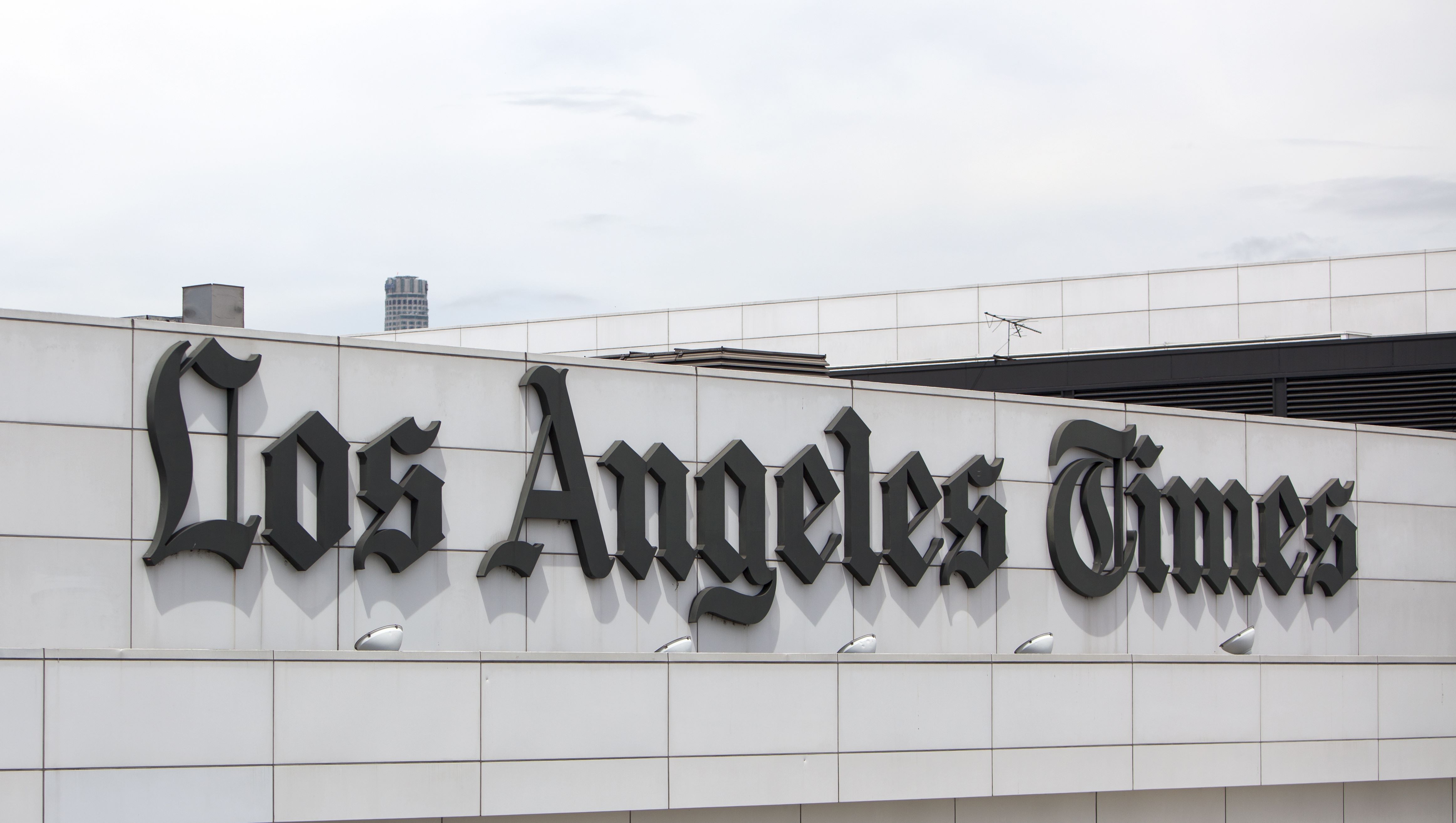إذا كانت التغطية المتحيزة للرواية الإسرائيلية في العديد من الصحف ووسائل الإعلام الغربية هي بطاقة مرور مضمونة لكبار الصحفيين ورؤساء التحرير إلى دائرة الحظوة لدى الملّاك والمستثمرين، فإنها قابلة لأن تغدو في بعض الحالات الاستثنائية سببا للخروج منها.
ففي الأسبوع الأول من العام الجديد، أعلنت صحيفة لوس أنجلوس تايمز الأمريكية نبأ استقالة المحرر التنفيذي فيها، وهو ما دعا عددا من المراقبين إلى تفسير ما حصل على أنه من التبعات العديدة التي تتركها الحرب الإسرائيلية في غزة على واقع الإعلام الأمريكي وربما على مستقبله.
فقد أتت استقالة كيفين ميريدا بعد جولات من التوتر والخلاف مع مالكي الصحيفة بشأن شكل التغطية للحرب والمدى الممكن لتحقيق نوع من التوازن فيها بعد استطالة المواجهة وتكشُّف حجم الكارثة الإنسانية التي خلفتها في القطاع المحاصر، والتي راح ضحيتها زهاء 30 ألفا من الشهداء، نصفهم تقريبا من الأطفال، فضلا عن التدمير الممنهج شبه الشامل للقطاع، على نحو جعل استمرار الحياة فيه ضربا من المستحيل، كما توعد القادة الإسرائيليون منذ بداية العدوان.
مالك الصحيفة الملياردير باتريك سون شيونغ، انتقد قرار منع الصحفيين الموقِّعين على العريضة من تغطية الشأن الإسرائيلي، أما ابنته نيكا سون شيونغ تعبّر عن موقف تضامني مع فلسطين عبر حسابها النشط على أكس.
لكن الخلاف لم يأت من أعلى الهرم في الصحيفة وحسب، بل كان حاضرا في قاعدته أيضا؛ ففي التاسع من نوفمبر/تشرين الثاني، وقّع عدد من الكتّاب في لوس أنجلوس تايمز على عريضة إدانة للحكومة الإسرائيلية واستهدافها تصفية الحياة المدنية في غزة وملاحقة الصحفيين فيها. كما تضمنت العريضة دعوة لغرف الأخبار الأمريكية لتوصيف أكثر موضوعية لواقع الحال في فلسطين المحتلة، عبر استخدام لغة تدين الاحتلال والعنف المنهجي في حق المدنيين الفلسطينيين، وتوظيف اصطلاحات قانونية مثل "الفصل العنصري" و"التطهير العرقي" و"الإبادة"، لوصف ما يجري في قطاع غزة.
أما إدارة الصحيفة العريقة، فقد تفاعلت مع تلك العريضة عبر تجميد أي دور لأولئك الصحفيين الموقعين على العريضة (وكانوا 16 صحفيا وصحفية) في تغطية الأخبار المتعلقة بالحرب على غزة، ولمدة ثلاثة أشهر، وهو ما بدا مؤشرا على مقدار التوتر في الإدارة العليا للصحيفة وحرصها على عدم مخالفة المتوقَّع لسياستها التحريرية بشأن فلسطين، ولا سيما من جماعات الضغط الداعمة لإسرائيل في الولايات المتحدة. والخشية من تأثير ذلك على الأداء المالي للصحيفة وأرباحها، في حال سَحْب الإعلانات أو تراجع أعداد المشتركين الذين يشكّل اليهود الأمريكيون نسبة غير قليلة منهم.
اضطرت إدارة الصحيفة، وبسبب تصاعد الضغط من موظفيها، إلى نشر مقال رأي موقَّع باسم إدارة التحرير، وفيه دعوة إلى ضرورة وقف الحرب، جاء في فقرته الأولى اتهام جيش الاحتلال بالقتل العشوائي للمدنيين في قطاع غزة.
رغم ذلك، اضطرت إدارة الصحيفة، وبسبب تصاعد الضغط من موظفيها، إلى نشر مقال رأي موقَّع باسم إدارة التحرير، وفيه دعوة إلى ضرورة وقف الحرب، جاء في فقرته الأولى اتهام جيش الاحتلال بالقتل العشوائي للمدنيين في قطاع غزة، كما تضمن مطالبة للإدارة الأمريكية بممارسة ما يلزم من الضغط على الحكومة الإسرائيلية والامتناع عن التواطؤ معها. كما بدا المقال تسوية من طرف إدارة التحرير مع مالك الصحيفة، الملياردير باتريك سون شيونغ، الذي انتقد قرار منع الصحفيين الموقِّعين على العريضة من تغطية الشأن الإسرائيلي، وابنته نيكا سون شيونغ التي تعبّر عن موقف تضامني مع فلسطين عبر حسابها النشط على أكس.
ورغم أن تغطية لوس أنجلوس تايمز ظلت في عمومها متحيزة للرواية الإسرائيلية خلال الأشهر الثلاثة الماضية، كما أثبت تحليل لموقع "ذا إنترسيبت"، فإن الصحيفة ظلت على رادار الرقيب الإسرائيلي، ولا سيما عبر الجماعات المؤيدة لإسرائيل وما لديها من أدوات ولجان ضغط على الإعلام الأمريكي، مثل لجنة "كاميرا" (لجنة تحري الدقة في تغطية أخبار الشرق الأوسط/CAMERA)، التي لم تكتف بالاحتجاج على المقال التحريري المذكور أعلاه، بل راحت تتحرى أي موقف متعاطف مع الفلسطينيين بين طاقم الصحيفة وتحرّض عليهم في وسائل التواصل الاجتماعي؛ مثلما حصل مع مدير التحرير في الصحيفة سارة ياسين، وادّعاء أنها تؤيد "حماس".
ورغم أن الصحيفة نفت رسميا أن يكون لمالكها أو ابنته أي تأثير في غرفة الأخبار، فإن تقريرا لموقع "ذا راب"، كشف نقلا عن أفراد مطلعين داخل الصحيفة أن الأمر ينطوي على قدر كبير من التعقيد والشد والجذب طوال الفترة الماضية؛ فبعد قرار ميريدا إبعاد الصحفيين عن تغطية أي شأن يتعلق بالحرب على غزة بسبب توقعيهم على تلك العريضة، تدخّلت نيكا بشكل مباشر وانتقدت القرار، كما شاركها والدها الموقف ذاته، كما أعرب في مقابلة أجريت معه مؤخرا عن انزعاجه مما حصل، خاصة أنه لم يكن في صورة القرار بشكل مسبق.
غير أن هذه الاختلافات التي ألفاها ميريدا مضرّة بالقيم الصحفية الكلاسيكية التي يؤمن بها، ورأى أنها تفتح بابا لتسييس الصحافة وأجْنَدتها، لا تحمل في طيّاتها إلا خوفا من الرقيب الإسرائيلي وجماعات الضغط الصهيونية المهيمنة.
أما كيفن ميريدا، وبعد سلسلة من الصدامات مع مالك الصحيفة وابنته بشأن الحرب على غزة وعدد من القضايا الحقوقية الأخرى، فقد قرر الاستقالة، مشيرا في خطاب استقالته إلى أن قراره عائد إلى عدد من العوامل، منها "الاختلافات في وجهات النظر حول دور المحرر التنفيذي، وكيف يجب ممارسة الصحافة، وتطبيق إستراتيجيات العمل".
غير أن هذه الاختلافات التي ألفاها ميريدا مضرّة بالقيم الصحفية الكلاسيكية التي يؤمن بها، ورأى أنها تفتح بابا لتسييس الصحافة وأجْنَدتها، لا تحمل في طيّاتها إلا خوفا من الرقيب الإسرائيلي وجماعات الضغط الصهيونية المهيمنة في مشهد الإعلام الأمريكي. فلا بأس عند ميريدا من مراعاة مثل هذه الضغوط، والاستجابة لها عبر تقديم تغطية متحيّزة عموما للاحتلال الإسرائيلي، أما لو كان الضغط يطالب بالعودة إلى جادة التوازن المهني، لأجل الحقيقة والموضوعية، ولأجل التضامن مع الحق الفلسطيني في الحرية والكرامة، فهذا وحده يكون مدعاة للانسحاب؛ لأنه الخيار الأكثر أمنا ما دام لا يزعج إسرائيل، التي تتزايد خشيتها من مفاعيل هذه الحرب الوحشية وتأثيرها على غرف الأخبار في الإعلام الأمريكي والعاملين فيها.











































